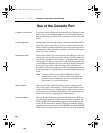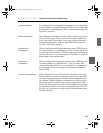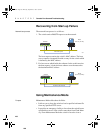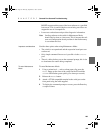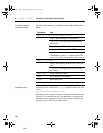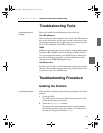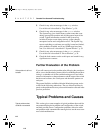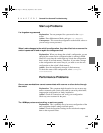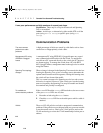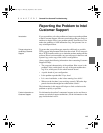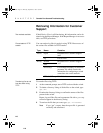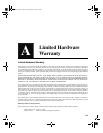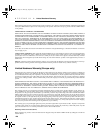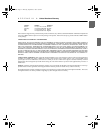
114
C H A P T E R 7 Console Port Use and Troubleshooting
114
I have poor performance and high numbers of second port drops
Explanation: There may be a loop in the network and Spanning
Tree is not enabled.
Action: Avoid loops, or alternatively, either enable STP on all the
ports (using
Device Setup) or specific ports (using Port
Setup
).
Communication Problems
The most common
problems are cable
problems
A high percentage of faults are caused by cable faults such as loose
connections or inappropriately wired cables.
Management PCs using
IEEE 802.1Q tagged
frames
A management PC using IEEE 802.1Q tagged frames may experi-
ence communication difficulties with the switch. To manage the
switch from a PC connected directly to the switch, the PC must not
use frame tagging. To manage the switch from a PC with IEEE
802.1Q tagged frames, management must be through a device which
untags the frames.
Spanning Tree topology
changes
When a change is detected in the Spanning Tree network, the devices
forming the Spanning Tree go into a learning state to determine the
optimal routes between network segments. During this learning state,
the switch will not forward data traffic.
This is a normal occurrence for Spanning tree devices and no reme-
dial action is required. However, if the switch goes into the learning
state too frequently, the Spanning Tree may be unstable and should
be examined and possibly reconfigured.
To troubleshoot
communications problems
If the POWER LED and the STATUS LED are both on, but one or more
of the port
STATUS LEDs are off, then:
1 Reset the switch using the Reset button.
2 Check the STATUS LED for each switch port to which a cable is
attached.
VLANs The use of VLAN policies can lead to unexpected communication
problems. If the policies are not designed with care, ports are not able
to reach network services. Check your VLAN policies and use the
VLAN monitoring to review the VLAN membership for that port or
address.
500.book Page 114 Thursday, September 2, 1999 1:30 PM



